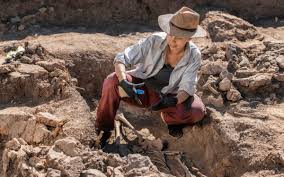
An international group of archaeologists have discovered a missing piece in the story of human evolution at the Israeli site of Nesher Ramla.
Daily Current Affairs Quiz 2021
It has recovered a skull that may represent a late-surviving example of a distinct Homo population, which lived in and around modern-day Israel from about 420,000 to 120,000 years ago.
As researchers Israel Hershkovitz, Yossi Zaidner and colleagues detail in two companion studies published in Science, this archaic human community traded both their culture and genes with nearby Homo sapiens groups for many thousands of years.
Pieces of a skull, including a right parietal (towards the back/side of the skull) and an almost complete mandible (jaw) were dated to 140,000–120,000 years old, with analysis finding the person it belonged to wasn’t fully H. sapiens.





